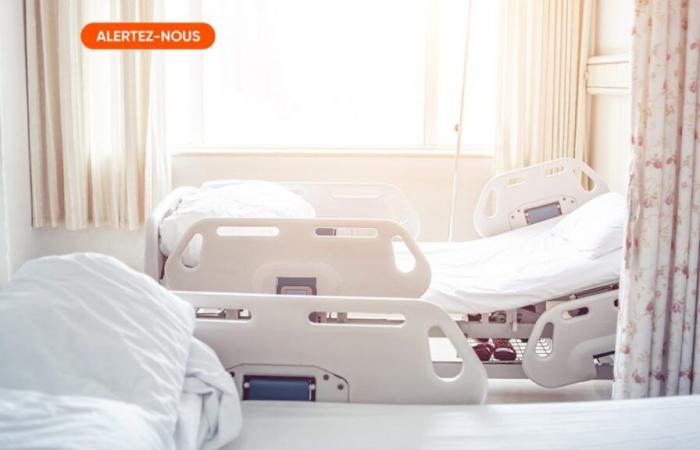
“Between 3 and sometimes 5 euros per day payable by the patient for the use of television in hospitals… After 2 months of hospitalization and 2 months of revalidation (in a common room), my brother paid in total 610 euros. I find that scandalous. You don’t go to the hospital for pleasure, you can buy one…” she regrets.
What should you pay attention to to avoid this type of hospitalization costs?
Given its missions linked to health care insurance, the INAMI (National Institute for Health and Disability Insurance) does not intervene in the cost linked to “room comfort” and products and services without strictly medical indication, such as the use of a television.
Concerning hospital billing, INAMI draws patients’ attention to a passage in the Agreement signed between hospitals and mutual funds: “(…) Upon admission, the patient or his representative receives the list of the most commonly requested products and services and the prices which can be taken into account (This obligation came into force on September 1, 2007). The patient has the right, at the time of admission, via the admission declaration to refuse or accept products and services in advance. For the provision of products and services that do not appear on this list, the consent of the patient or their representative is required. These products and services, delivered by the hospital, are charged to the patient exclusively by means of the invoice, under the heading ‘miscellaneous costs’.”
Is the amount charged to Geneviève’s brother for the use of the television “exorbitant” or within the norm? We asked the question to different mutual insurance companies. Here are their responses:
Christian Mutuality (MC):
“The amount, even if high, does not seem above average to us knowing that, in general, hospitals charge patients 10€/day for costs which include access to television, wifi, fridge, etc. If TV only, it is around 4€/day”, specifies spokesperson Simon Vandamme.
“Policies on this subject may vary from one hospital to another. Please note, and this is very important, that all of this must be reported to the patient before admission via an admission declaration which is mandatory and that the patient must sign before entering. We therefore advise you to read this document carefully to avoid unpleasant surprises. Generally, the health insurance of the mutual insurance company covers these costs. the Christian Mutuality The patient will therefore be reimbursed for. these costs.”
Free Mutualities:
“The procedures relating to the use of television in hospitals vary considerably from one establishment to another”indicates Marianne Hiernaux, spokesperson for Mutualités Libres (Partenamut).
“Some hospitals charge for television per day, while others include it in a package deal. Access to this service may sometimes require an activation request from reception or technical service. In some cases, TV is included in double or shared rooms, but a supplement may be requested for single rooms. Conversely, some establishments include it directly in the cost of the stay, regardless of the type of rooms.
“In this context, patient vigilance is essential”, underlines Marianne Hiernaux. “During admission, it is important that they inquire about any supplements, or even that they explicitly indicate their choice not to use the television if it is activated by default. Furthermore, it is also It is crucial to check the coverage of their hospitalization insurance. Some insurers cover these costs, generally with a reimbursement ceiling, while others do not intervene at all.
-Hospitals also have a key role to play in transparency. “They must be clear about their prices and fully inform patients about their billing practices”adds the spokesperson for Mutualités Libres. “Regarding reimbursements, it is important to note that mutual insurance companies do not cover this type of expense. These supplements are considered non-medical comfort services. However, in the event of doubt or dispute of an invoice, the “Affiliate can always request their mutuality for verification.”
And to conclude: “Finally, in the specific case you mention, the amount seems high. For comparison, some hospitals offer this service for free, like Wi-Fi. Television in hospitals should not be perceived as a luxury, but as an essential convenience In an environment often marked by isolation and discomfort, it constitutes a valuable distraction, even a necessity.
Supporters:
“If we want a television or another element of ‘comfort’, the first question to ask is to know how much it will cost and above all how long we will stay in the hospital… then we do the calculation and we decide according to its means”, also underlines Julie Jandrain, the spokesperson for Solidaris. “Should we take out specific insurance? A priori, we do not think that there is insurance which automatically covers these various costs.”
How have comfort costs changed in recent years? “Is using television much more expensive than before? Difficult to objectively say but we asked the question to two managers who did not notice in the invoices processed that the miscellaneous costs had increased considerably .”
Could new regulations be introduced regarding supplements related to comfort in hospital rooms?“In the immediate future, it seems complicated, but we cannot answer this question with certainty. If this person had been affiliated with us, we would have offered to go through Jurimut to help them. Let’s see if their insurance offers this service as well. We also sometimes refer to the hospital’s mediation service.”
What services and products are in high demand in hospitals?
GIBBIS, the federation of healthcare institutions in the public and private associative sectors of the Brussels-Capital Region, recalls for its part that the price of comfort services (various services) – non-medical – can be consulted within each hospital.
“The document annexed to the admission declaration containing the explanations concerning the admission declaration, of which each patient becomes aware when entering the hospital and which is identical for all hospital establishments, specifies in particular the information relating to costs miscellaneous.”
The federation also gives some examples of services and products in high demand in its hospitals:
– comfort of the room: telephone, refrigerator, television and internet connection
– meals and drinks: additional meals, snacks, snacks and drinks
– hygiene products: basic toiletries (soap, toothpaste, cologne, etc.) and toiletries (comb, toothbrush, shaving kit, paper tissues, etc.)
– laundry (personal laundry)
– accompanying person: occupation of a room or bed, meals and drinks
– other miscellaneous goods and services: other goods in high demand (bottles, pacifiers, breast pumps, crutches, earplugs, small office essentials, etc.) and services in high demand (manicure, pedicure, hairdresser, etc.),…





